新概念第二册51
- 格式:docx
- 大小:76.26 KB
- 文档页数:6
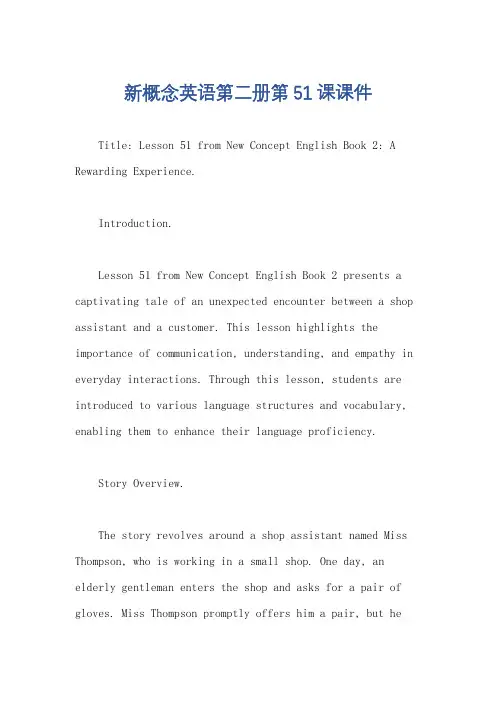
新概念英语第二册第51课课件Title: Lesson 51 from New Concept English Book 2: A Rewarding Experience.Introduction.Lesson 51 from New Concept English Book 2 presents a captivating tale of an unexpected encounter between a shop assistant and a customer. This lesson highlights the importance of communication, understanding, and empathy in everyday interactions. Through this lesson, students are introduced to various language structures and vocabulary, enabling them to enhance their language proficiency.Story Overview.The story revolves around a shop assistant named Miss Thompson, who is working in a small shop. One day, an elderly gentleman enters the shop and asks for a pair of gloves. Miss Thompson promptly offers him a pair, but hedeclines, saying that they do not fit him. She thensuggests another pair, but he again refuses, stating that they are too tight. This goes on for several pairs of gloves, with the gentleman politely declining each offer.Miss Thompson becomes increasingly frustrated, as she believes that the gentleman is being difficult. However,she manages to maintain her composure and continues tooffer him different gloves. Finally, the gentleman apologizes and explains that he has a very peculiar problem: his hands are so sensitive that he can only wear gloves made from the skin of a dead animal.Miss Thompson is taken aback by this revelation, but quickly recovers and offers the gentleman a pair of gloves made from the skin of a dead monkey. To her surprise, he accepts them gratefully and pays for them. The lesson concludes with Miss Thompson realizing that she has learned a valuable lesson about understanding and empathy.Language Structures and Vocabulary.Lesson 51 introduces students to various language structures and vocabulary that are essential for enhancing their language proficiency. Some of the key language points include:1. Modal Verbs: The lesson uses modal verbs such as "can" and "could" to express ability and possibility. For example, the gentleman says, "I can only wear gloves made from the skin of a dead animal," indicating his unique requirement.2. Adjectives: The lesson employs adjectives to describe the characteristics of gloves and the gentleman's hands. For instance, "tight" is used to describe the gloves that do not fit the gentleman, while "sensitive" is used to describe his hands.3. Conditionals: The lesson presents conditional sentences, such as "If you have any other kind, I'll try them on." This structure allows for expressions of hypothetical situations and their consequences.In addition to these language structures, the lesson also introduces new vocabulary words such as "peculiar," "sensitive," "monkey," and "glove." These words are essential for understanding the story and expanding the student's vocabulary.Themes and Lessons.Lesson 51 explores themes of communication, understanding, and empathy. Through the interaction between Miss Thompson and the elderly gentleman, the lesson teaches the importance of patience and listening skills in communication. Miss Thompson initially becomes frustrated with the gentleman's refusals, but she manages to maintain her composure and continue offering him different gloves. This demonstrates the importance of staying calm and maintaining a positive attitude when faced with communication challenges.Moreover, the lesson emphasizes the need for understanding and empathy. Miss Thompson initially misinterprets the gentleman's refusals as being difficult,but later realizes that he has a unique problem that requires special attention. This realization teaches the student the importance of putting oneself in others' shoes and trying to understand their perspectives.Conclusion.Lesson 51 from New Concept English Book 2 is a rewarding experience that teaches students valuable lessons about communication, understanding, and empathy. Through engaging storytelling and language structures, the lesson enables students to enhance their language proficiency while learning important life lessons. By practicing the language points introduced in this lesson, students can improve their ability to communicate effectively in various situations.。
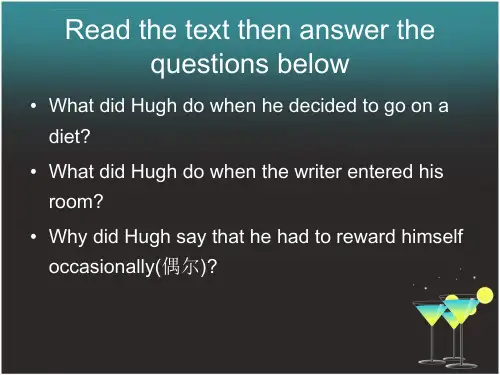
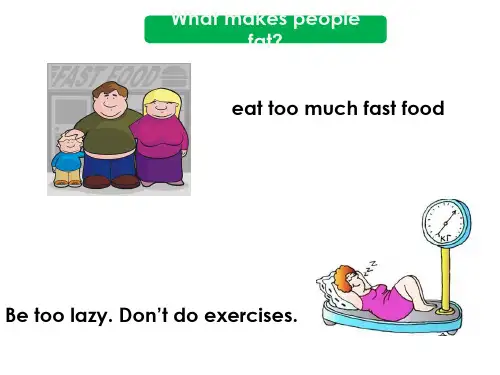

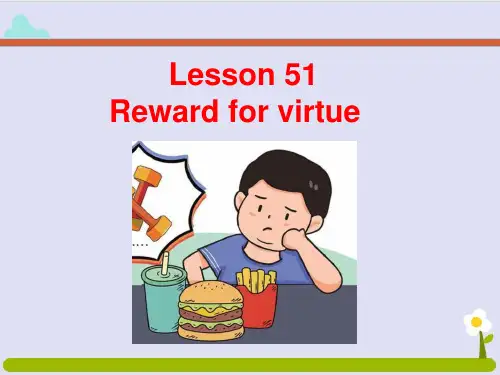
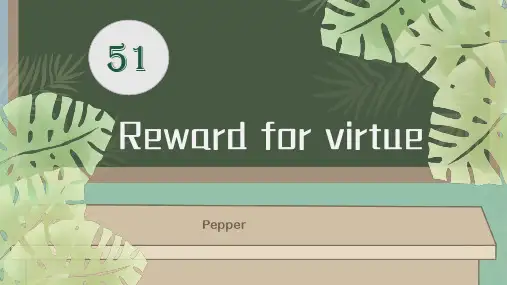

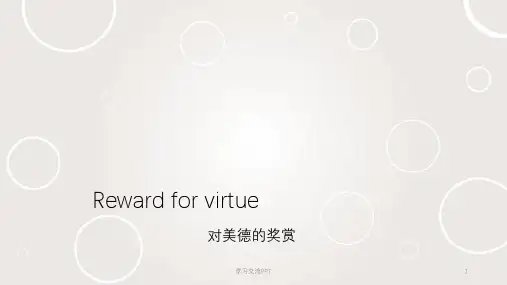
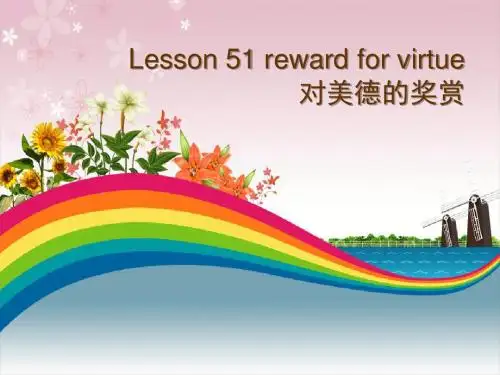
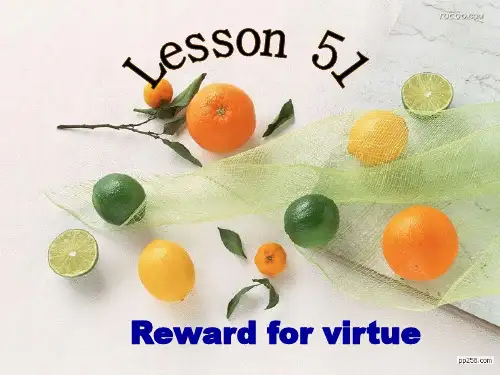
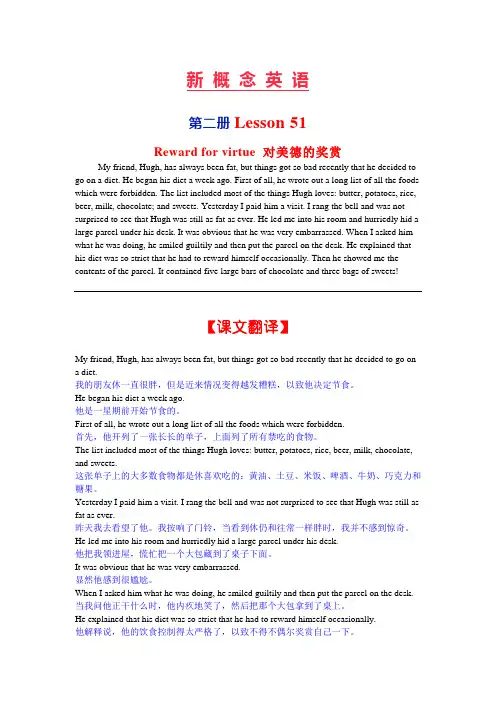
新概念英语第二册Lesson 51Reward for virtue 对美德的奖赏My friend, Hugh, has always been fat, but things got so bad recently that he decided to go on a diet. He began his diet a week ago. First of all, he wrote out a long list of all the foods which were forbidden. The list included most of the things Hugh loves: butter, potatoes, rice, beer, milk, chocolate; and sweets. Yesterday I paid him a visit. I rang the bell and was not surprised to see that Hugh was still as fat as ever. He led me into his room and hurriedly hid a large parcel under his desk. It was obvious that he was very embarrassed. When I asked him what he was doing, he smiled guiltily and then put the parcel on the desk. He explained that his diet was so strict that he had to reward himself occasionally. Then he showed me the【课文翻译】My friend, Hugh, has always been fat, but things got so bad recently that he decided to go on a diet.我的朋友休一直很胖,但是近来情况变得越发糟糕,以致他决定节食。
Lesson 51 单词讲解1. rewardn. 报偿v. 给奖赏reward sb.reward oneselfYou worked so hard, and you need to reward yourself occasionally.2. diet n. 节食go on a diet / begin a dietbe on a dietI am on a diet now.3. hurriedly adv. 匆忙地do sth. hurriedlyhurry v. 匆忙4. embarrass v. 使尴尬You embarrass me.I am embarrassed.embarrassed adj. 尴尬的embarrassing adj. 使人尴尬的5. guiltily adv. 内疚地guilt n.guilty adj.6. occasionally adv. 偶尔地occasion n.occasional adj.Lesson 51 课文&语法讲解1. My friend, Hugh, has always been fat …2. … but things got so bad recently that he decided to go on a diet.get got got / gottenget badgo on a diet3. … but things got so bad recently that he decided to go on a diet.so … that …The story is interesting. I want to share it with you.The story is so interesting that I want to share it …4. First of all, he wrote out a … list of all the foods which were forbidden.first of allwrite wrote written5. The list included most of the things Hugh loves : butter, potatoes, rice, beer, milk …The list included most of the things (that) Hugh loves6. Yesterday I paid him a visit.pay sb. a visit = visit sb.n. v.7. I rang the bell and was not surprised to see that …ring rang rungring the bellbe surprised to do sth.8. … to see that Hugh was still as fat as ever.as … as …as fat as ever8. He led me into his room and hurriedly hid a … parcel ...lead led ledhide hid hidden9. It was obvious that he was very embarrassed.=That he was very embarrassed was obvious.主语从句10. When I asked him what he was doing, he smiled guiltily and then put the parcel …11. He explained that his diet was so strict that he had to reward himself occasionally.12. Then he showed me the contents of the parcel.contents n. 内有的物品the contents of …Lesson 51 知识拓展英语为什么难?1 +1 > 2综合运用(多个知识点相结合)My friend, Hugh, has always been fat, but things got so bad recently that he decided to go on a diet.1. My friend, Hugh 同位语2. has been 现在完成时3. but 并列句(表示转折)4. so … that …结果状语从句5. get baddecide to dogo on a dietI rang the bell and was not surprised to see that Hugh was still as fat as ever.1. ring the bellbe surprised to do2. and 并列句3. see that …宾语从句4. as … as …同级比较。
Lesson 51 Reward for virtueIn today’s section we’ll look at the story about a man who had weight problem. The title of the lesson is Reward for virtue. 有体重问题的人为了节食减肥做了一些事情。
一、词汇学习:1、reward:n.报偿复数形式:rewards;短语:in reward:作为报偿eg:He received a medal in reward for his bravery. 他因为他的勇敢而得到了一枚奖章作为回报。
V.给予报偿,报答You will be fully rewarded with all your efforts.你所有的努力都将得到充分的回报。
Is this how you reward me for my help?你就这样报答我对你的帮助吗?rewarding:报酬的;有益的,值得的 a rewarding experience:一次富有价值的经验2、virtue:n.美德 a man of virtue 有德之人3、diet:n.节食go on a diet=be on a diet 进行节食n.(日常的)饮食 a balanced diet 均衡的饮食4、forbid:v.禁止forbad forbidden forbidding the Forbidden city 紫禁城forbid sb to do sth 禁止某人做某事My father forbad me to watch television . 我的父親就禁止我看電視。
5、hurriedly:adv.匆忙的;hurried :adj.仓促的,慌忙的;hurry:v. 匆忙Hurry up!hurry to+地点:匆忙赶到某地He hurried back to his office.他匆忙赶到他的办公室。
Lesson 51 Reward for virtue 阅读理解1. What did Hugh do when he decided to go on a diet?He wrote out a long list of all the foods which were forbidden.2. What did Hugh do when the writer entered his room?He hurriedly hid a large parcel under his desk.单词详解1. reward n. 酬谢,酬劳派生:reward sb. for sth. v. 因为某事给某人奖励或报酬2. virtue n. 美德翻译:It is our traditional virtue to respect and honor the aged.尊老敬老是我们的传统美德。
3. diet n. 节食翻译:他在一星期前开始节食。
He went on a diet a week ago.扩展:lose one’s weight / keep fit减肥4. forbid v. 禁止(forbid – forbade – forbidden)结构:forbid sb. to do / forbid doing sth. 禁止某人做某事翻译:我的父母不许我在外面过夜。
My parents forbid me to stay out at night.反义词:allow / permit5. hurriedly adv. 匆忙地= in a hurry翻译:我们不得不匆忙吃完早餐,不然就要迟到了。
【趣味知识1】谚语:Virtue is its own reward. 有德便是有报。
【思考1】猜猜diet drinks什么意思?低热量饮料【趣味知识2】There was no hurry. I had all the time in the world.We have to finish our breakfast hurriedly, or we are late.6. embarrass v. 使尴尬翻译:我要他好看!I want to really embarrass him.派生:embarrassed / embarrassing adj.翻译:他们问她的年龄时,她非常尴尬。
She was embarrassed when they asked her age.我不喜欢在公开场合演说,太令人尴尬了。
I don’t like making speeches in public. It’s so embarrassing.7. guiltily adv. 内疚地e.g. I took one cigarette guiltily.猜猜上句中的“I”在什么阶段:give up smoking派生:guilty adj. 内疚的,guilt n. 内疚词组:a sense of guilt 内疚感8. strict adj. 严格的结构:be strict with = be hard on 对……严格翻译:老师对他的学生非常严格。
The teacher is very strict with his students.9. occasionally adv. 偶尔地课文解析1. My friend, Hugh, has always been fat, but things got so bad recently that he decided to go on a diet. 【复习】还记得我们第13课学过的occasion词性和含义吗?名词,场合●语法:so … that …如此……以至于……●词组:go on a diet节食2. He began his diet a week ago. First of all, he wrote out a long list of all the foods which were forbidden.●词组:first of all表示首先写作:用于表达个人观点时:首先/其次/再次/最后:first of all/ in addition / moreover / finally●词组:write out = list●语法:which引导定语从句3. The list included most of the things Hugh loves: butter, potatoes, rice, beer, milk, chocolateand sweets. Yesterday I paid him a visit.●以上食物用一个词形容:fattening●词组:pay sb. a visit = pay a visit to sb. / visit sb.翻译:我一个月拜访我老师一次。
I pay my teacher a visit/pay a visit to my teacher once a month.4. I rang the bell and was not surprised to see that Hugh was still as fat as ever.●语法:that引导宾语从句●词组:as … as ever 跟以往一样……翻译:你还是跟以前一样能说啊。
You are as talkative as ever.5. He led me into his room and hurriedly hid a large parcel under his desk. 【趣味知识3】最容易使人发胖的食物:1. 巧克力饼干;2. 巧克力棒;3. 罐装果汁;4. 普通可乐;5. 啤酒【思考2】尝试理解这段话:“Ever tried. Ever failed. No matter. Try Again. Fail again. Fail better.”努力过,失败过,没关系,屡战屡败,屡败屡战,每一次失败都比上一次更好。
●词组:lead sb. into sp. 将某人带进……扩展:lead to含义多样:翻译:All roads lead to Rome. 通往Smoking leads to his lung cancer. 导致●单词:hid原形hide隐藏6. It was obvious that he was very embarrassed.●语法:it 是形式主语, 此句为that引导的主语从句(详见语法重点)●句式:It was obvious that … 很明显的是……= It is clear that …翻译:很明显,他就是凶手。
It is obvious that he is the murderer.7. When I asked him what he was doing, he smiled guiltily and then put the parcel on the desk.●语法:宾语从句语序:陈述句语序8. He explained that his diet was so strict that he had to reward himself occasionally. Then he showed me the contents of the parcel. It contained five large bars of chocolate and three bags of sweets!●词组:five large bars of chocolate 五大条巧克力three bags of sweets 三包糖果补充:英文中常见的量词有piece / pair / glass / bowl / drop / bar 等等一片厚芝士a thick piece of cheese一杯新鲜牛奶a fresh glass of milk 【思考3】改成同义句“Obviously, he was very embarrassed.”【赏析】如何理解课文标题Reward for virtue?reward指the parcel of fattening food;virtue指going on a diet一块很大的肥皂a large bar of soap一滴脏水a dirty drop of water总结:a + 形容词+ 量词+ of + n.语法重点主语从句:用作主语的从句,叫主语从句。
(大多用法与宾语从句相同)语序:陈述句语序主语从句位置:可以放在句首;也可用it作形式主语,而将从句放在句末。
翻译:他跑得这么快,让我们大吃一惊。
That he ran so fast shocked us.It shocked us that he ran so fast.主语从句的引导词(含义与宾语从句相同):that(无意义,但是不可省略),whether(是否,不可以用if),which,what(……的,不用it代替),where,when,why等特殊疑问词。
找出以下句子的主语从句,并口头翻译:Whether they will support us is a problem.When we arrive doesn’t matter.How it was done was a mystery.翻译:他说的话并不重要。
What he said is not important.你能来参加我的婚礼是我的荣幸。
It is my honor that you can attend my wedding.【Challenge yourself!】【Easy】Choose the correct answer.( C ) 1. ________ we are saying is more than ________ we will do.A. What; thatB. That; whatC.What; whatD. That; that【Medium】Choose the correct answer.( A ) 2. ________ we will have a meeting hasn’t been decided yet.A. WhetherB. IfC. ThatD. What( A ) 3. _____ we go swimming every day _____ us a lot of good.A. That; doesB. If; doC. That; doD. What; does【Hard】Combine two sentences into one.4. What did I see? It is a very beautiful garden.What I saw is a very beautiful garden.5. She slept soundly. She didn’t hear anything.She slept so soundly that she didn’t hear anything.。